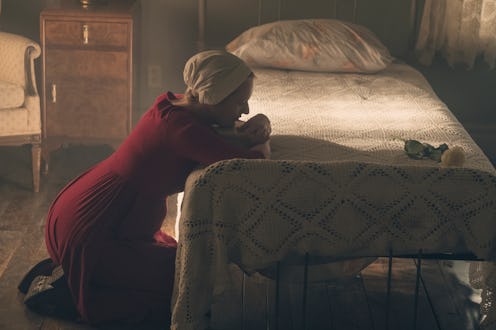Entertainment
'The Handmaid's Tale' Season 2 Has A Margaret Atwood Reference That Totally Breaks The 4th Wall

The Handmaid's Tale may have just jumped the shark. The eighth episode pulled a meta-reference that kind of breaks the fabric of the show, because it seems like The Handmaid's Tale quoted Margaret Atwood, author of The Handmaid's Tale, thus implying that she exists in the world of The Handmaid's Tale? It certainly confuses things a bit.
In one of the final moments of the episode, June says in voiceover:
"Someone once said, 'Men are afraid that women will laugh at them. Women are afraid that men will kill them.' We should have known better. I thought there were still secret places, hidden in the cracks and crevices of this world. Places we could make beautiful. Peaceful. Quiet. Safe. Or at least bearable."
By this point in the episode, Serena and June's secret work has been discovered by Commander Waterford, and Fred beats his wife as a punishment — as is his legal right in Gilead. The quote represents not only the stakes in this awful world for these women, but the fact that those stakes exist in the back of our heads in our world as well.
You've definitely heard that quote about men and women before, right? The famous words are often attributed to Atwood. So is the "someone" June is referring to actually her own creator? How strange is that?
The answer is a bit complicated, as the etymology behind popular quotations often is — like a profound game of "telephone" where, bit by bit, things change. In Atwood's 1995 collection of essays Second Words: Selected Critical Prose, she relays the following anecdote in a passage:
"Why do men feel threatened by women?" I asked a male friend of mine. (I love that wonderful rhetorical phrase "a male friend of mine." It's often used by female journalists when they want to say something particuarly b*tchy but don't want to be held responsible for it themselves. It also lets people know that you do have male friends, that you aren't one of those fire-breathing mythical monsters, The Radical Feminists, who walk around with little pairs of scissors and kick men in the shins if they open doors for you. "A male friend of mine" also gives — let us at admit it — a certain weight to the opinions expressed.) So this male friend of mine, who does by the way exist, conveniently entered into the following dialogue. "I mean," I said, "men are bigger, most of the time, they can run faster, strangle better, and they have on the average a lot more money and power." "They're afraid women will laugh at them," he said. "Undercut their world view." Then I asked some women students in a quickie poetry seminar I was giving, "Why do women feel threatened by men?" "They're afraid of being killed," they said.
However, a more succinct (and uncredited, mind) version of the quote appears in Gift of Fear by Gavin De Becker from 1998. Isn't that just deliciously ironic that a male writer summed up Atwood's words, did not name his source, and it's his version that gets retold? At least Atwood seemingly got the last word, as it is attributed to her anyway.
"It is understandable that the perspectives of men and women on safety are so different — men and women live in different worlds," De Becker wrote. "I don’t remember where I first heard this simple description of one dramatic contrast between the genders, but it is strikingly accurate: At core, men are afraid women will laugh at them, while at core, women are afraid men will kill them."
Does the reference break your suspension of disbelief? Handmaid's Tale often feels too real. Just a few months ago, Buzzfeed reported on closed-door United Nations meetings in which a senior advisor from the United States reportedly said that we are a "pro-life nation," implied that women are at fault for what happens to them, said young women should be taught "sexual refusal skills," and other regressive notions basically straight out of Aunt Lydia's book. Just this past week the Supreme Court further legalized discrimination against same-sex couples and LGBT citizens.
On the Hulu series, the protests that June and Moira attend feel a lot like the Women's Marches of the past few years. At this point, it's almost easy to picture June and Moira watching a similar streaming TV series in a flashback and talking about how it feels too real to them.
Margaret Atwood is a noted feminist writer, so it makes sense that the characters on the show would be familiar with her — but does that also mean that Mad Men, Gilmore Girls, and Orange Is The New Black exist on The Handmaid's Tale? There has to be some kind of line of demarcation.
Since it's not actually a direct Atwood quote, perhaps this is just a cheeky nod to the author and the fuzzy background of the adage. Still, even without context, it still works to hammer home a distressing concept on The Handmaid's Tale — and prove once again how "real" this fictional world can be.